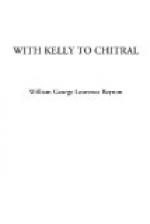Here I may as well describe what the force consisted of. First, there were four hundred men of the 32nd Pioneers, commanded by Borradaile, Colonel Kelly having taken command of the column. Bar these two, we were all subalterns. Peterson was the senior, and commanded the second detachment, as we were marching to Ghizr in two parties. Then there was Bethune the adjutant, and Cobbe, and Browning-Smith the doctor—these were all 32nd Pioneers. Captain de Vismes, 10th Bombay Infantry, came along with us as far as Gupis, where he relieved Stewart, R.A., who, of course, was in command of the two guns of No. 1 Kashmir Mountain Battery. Stewart is an Irishman and the most bloodthirsty individual I have come across. He used to complain bitterly because the Chitralis wouldn’t give us a fight every day. Then there was Luard, the Agency Surgeon; we used to chaff him considerably during the march to Gupis, as he turned up in a Norfolk jacket and a celluloid collar. I think he had sent his kit on to Gupis; at any rate, after that place he dressed in Khaki uniform like the rest of us. These were all who started from Gilgit, so I’ll introduce the others as we pick them up.
CHAPTER II
THE MARCH BEGINS
Colonel Kelly assumed command on the 22nd March, and the next morning the first detachment of two hundred Pioneers, under Borradaile, marched off. The local Bible, commonly known as the Gazetteer, states that it never rains in Gilgit; this being so, it naturally started to rain on the morning of the 23rd, and kept it up for two days. We were marching without tents, so the first night the men had to run up their waterproof sheets into shelters.
Colonel Kelly, Luard, and myself started about 2 P.M. to catch up the troops, who had started about 9 A.M. Luard had a beast of a pulling pony, and as his double bridle hadn’t got a curb chain, it was about as much use as a headache, so I suggested he should let the pony rip, and promised to bury his remains if he came a cropper. He took my advice and ripped; you couldn’t see his pony’s heels for dust as he disappeared across the plain. We found him all right in camp when we got there.
The men were already in camp, and pretty comfortable, in spite of the rain. Colonel Kelly had a small tent, and the rest of us turned into convenient cow-sheds. We were not troubled with much baggage, bedding, greatcoats, and a change of clothing; the men had poshteens (sheepskin coats), and everybody pleased themselves in the matter of boots, most of us preferring chuplies—a native kind of sandal with a leather sock, a very good article in snow, as you can put on any number of socks without stopping the circulation of blood in your feet. Officers and men were all provided with goggles, and very necessary they were.




